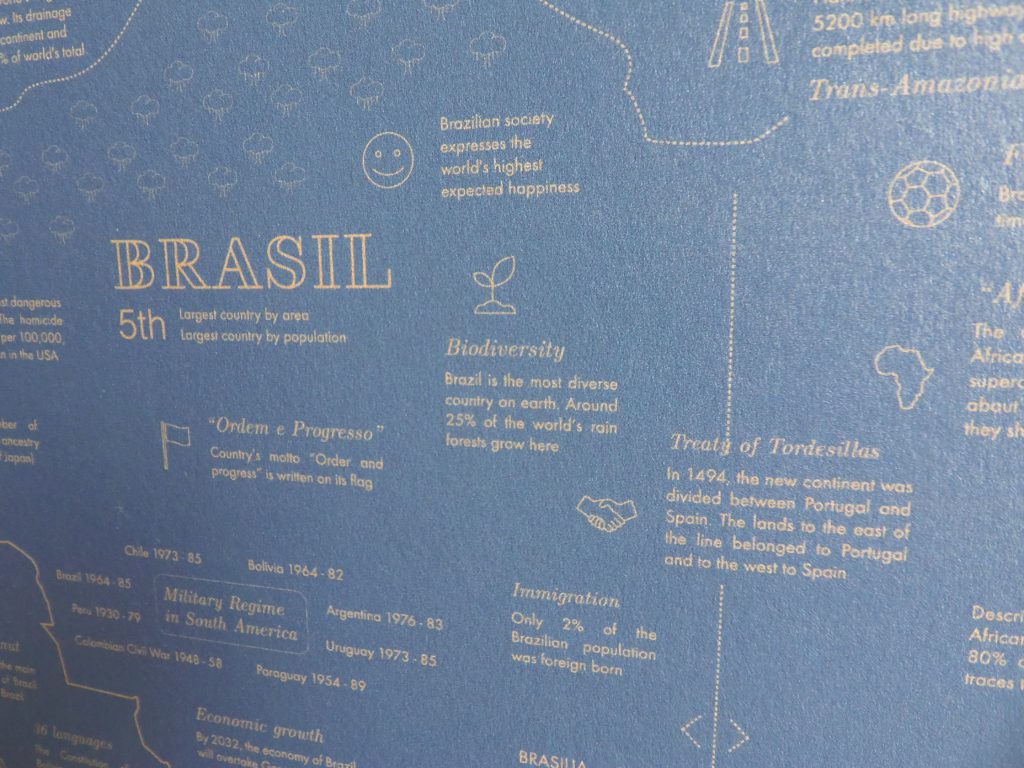Pamiętacie lekcje geografii w podstawówce i globusy, dumnie prężące się na ławkach ? Uwielbiałam szukać na wyrywki krajów, kręcąc z wypiekami na twarzy tym kulistym przyrządem dydaktycznym (świetnie się również sprawdzał jako broń w czasie bójek, przy mocniejszych uderzeniach prezentując niestety jednorazową skuteczność). W liceum sprawa wyglądała już mniej kolorowo. Nie znosiłam tego przedmiotu przede wszystkim dlatego, że wisząca na tablicy ogromna, “trójwymiarowa” mapa, była dla mnie czytelna mniej więcej na tym samym poziomie, co menu knajpy w Bangkoku. Jestem jednak przekonana, że gdyby poniższe cudo wcześniej trafiło na rynek, moje podejście do tej,bądź co bądź ciekawej nauki przyrodniczej, byłoby diametralnie odmienne.
Ale po kolei. Otóż któregoś pięknego dnia, zafascynowane podróżowaniem rodzeństwo wraz ze szwagrem (czyli mężem siostry – przyp. autora dla tych, którzy w szkole nie przepadali z kolei za biologią czy innym WOSem), postanowiło stworzyć wielką mapę świata, prezentującą oprócz czysto topograficznych informacji, także kompendium wiedzy wszelakiej, podanej w interesujący sposób. Ich zamiłowanie do atlasów oraz popularnonaukowych książek z lat szczenięcych zaowocowało powstaniem cudeńka, które zachwyci każdego miłośnika wojaży. I tak właśnie narodziło się Explorer’s Atlas.
Jeżdżąc po tej kartograficznej wersji naszego pięknego globu, będziecie mogli odkryć ponad tysiąc interesujących faktów, począwszy od ciekawostek na temat fauny i flory poszczególnych regionów, przez statystyki ekonomiczne, na trasach przeróżnych trawelerów kończąc. Jeszcze nigdy nie widziałam takiego nagromadzenia danych na jednej mapie, a Wy??

Ponieważ przedstawicielka płci pięknej tego pomysłowego trio jest malarką, a je brat grafikiem, oczywiście dzieło prezentuje się naprawdę pięknie. Minimalistyczne, utrzymane w jednolitej szarości lub granacie, kusi nie ozdobnikami, a wyjątkową treścią. Aczkolwiek mimo prostoty formy, stworzenie tej kompozycji wcale nie należało do najłatwiejszych dokonań – zaprojektowanie Explorer’s Atlas to około półroczny proces szukania czcionek, formatów, papierów, testowania technologii druku, jakości dostawców etc. Jednym słowem spore wyzwanie i grube przedsięwzięcie, dlatego poświęcili mu się całkowicie. Rzucili swoje dotychczasowe prace zarobkowe na ciepłych etatach (chapeau bas za odwagę!) i ruszyli z własnym biznesem.
Póki co mapę można zamawiać pod tym linkiem, a już niebawem również na ich stronie explorersatlas.com. Trzymamy mocno kciuki, żeby wszyscy ciekawi życia ludzie zakochali się w Explorer’s Atlas!









wonderful post, very informative. I wonder why the other specialists of this sector don’t notice this. You must continue your writing. I’m confident, you have a great readers’ base already!
Scrap aluminium procurement Efficient aluminium scrap handling Aluminium scrap brokerage
Copper alloy sorting Copper scrap contamination control Copper scrap licensing
Copper extrusion scrap Copper scrap identification Copper scrap market forecasting
Copper scrap market research Copper scrap smelting technologies Copper scrap licensing
Copper scrap testing Copper scrap value extraction Copper rod recycling
Advanced metal recycling Ferrous material certification Iron scrap transport
Ferrous material recycling cost-effectiveness, Iron reclamation and recovery, Metal recycling best practices
Logistics optimization for metal recycling Scrap aluminium packaging standards Scrap aluminum repurposing
Scrap metal processing center, Aluminum cable scrap utilization, Scrap metal recuperation
Metal scrap collection Scrap aluminium refurbishment Aluminium scrap community outreach
Metal scrap trading, Aluminum cable scrap transportation logistics, Recycling Sustainability
Metal recycling and reclamation solutions Scrap aluminium grade identification Scrap aluminium operations
Metal waste reclamation and recycling, Aluminum cable scrap exporters, Scrap metal quotations
Metal scrap processing Aluminium recycling transportation Scrap aluminium conversion
Metal scraps reclamation facility, Aluminum cable scrap dealers, Scrap metal market competition
Metal recovery and recycling Aluminium scrap quality management Aluminum recycling partnerships
Metal recycling and recovery center, Aluminum cable scrap alloys, Metal reuse services
Scrap collection network Aluminum scrap recycling value Aluminium scrap warehousing
Environmental compliance in metal recycling, Environmental benefits of recycling aluminum cable scrap, Metal recycling consultancy
Copper scrap segregation Copper sheet coil scrap buyer Copper alloy refining
Scrap metal reclamation industry, Industrial Copper scrap, Scrap metal reclamation center
Copper scrap traders Mining has been an integral part of human civilization for over 70 centuries. Since prehistoric times, people have been extracting minerals and ores from the earth for various purposes. The ancient Egyptians and Greeks mined gold and silver for use in jewelry and currency. The Romans utilized mining to extract iron, copper, and lead for the construction of their vast empire. In the Middle Ages, mining expanded throughout Europe, with miners excavating salt, coal, and precious metals. Mining boomed during the Industrial Revolution as demand for coal and iron skyrocketed. This led to the creation of modern mining techniques and technologies, such as steam engines and drills. The 20th century saw a surge in mining activity as new countries entered the market, such as Australia and South Africa. Advances in technology allowed for greater efficiency and safety in mining operations. The development of modern mining processes also led to increased environmental awareness and regulations. Today, mining continues to play a vital role in global society, providing essential metals and minerals for manufacturing, construction, and technology. However, the industry also faces challenges such as environmental concerns, labor issues, and market volatility. Despite these challenges, the history of mining shows its significance throughout human history. From ancient civilizations to modern societies, mining has been a fundamental aspect of human progress and development Scrap metal reprocessing centers Copper scrap collection Scrap copper trading Copper scrap exporters Secondary copper market Metal waste reclamation services
Scrap copper trade There are a few reasons why copper wire is not commonly used as a fuse wire: 1. Conductivity: Copper is a very good conductor of electricity, which means that it does not offer much resistance to the flow of current. This means that a copper wire would have to be very thin to provide enough resistance to act as a fuse. However, a very thin wire would be more susceptible to damage and breakage than a thicker wire. 2. Melting point: The purpose of a fuse is to protect electrical equipment from damage caused by excessive current flow. When the current exceeds a certain threshold, the fuse wire melts and breaks the circuit, protecting the equipment. Copper has a relatively high melting point compared to other materials used for fuse wires, such as silver or tin. This means that a copper wire would require more current to melt, which could result in the equipment being damaged before the fuse wire breaks. 3. Availability: While copper is a widely used material in electrical systems, it is not typically used as a fuse wire. This means that there are other more readily available materials that are better suited for use as fuse wires. Overall, while copper is a useful material for many aspects of electrical systems, it is not an ideal material for use as a fuse wire due to its low resistance and high melting point Scrap metal waste Scrap copper sales and marketing Industrial copper reprocessing Copper scrap Copper radiator recycling Metal reclaiming and reprocessing facility
Thanks for all your efforts that you have put in this. very interesting info .
Metal scrap repurposing plant Scrap metal reclamation and reclaiming Iron scrap reclaimer
Ferrous metal disposal, Iron scrap trading, Eco-friendly metal recycling
As I web-site possessor I believe the content material here is rattling magnificent , appreciate it for your efforts. You should keep it up forever! Good Luck.
I like looking at and I think this website got some truly utilitarian stuff on it! .
Metal waste repurposing Ferrous material baling machinery Iron waste reclaiming facility
Ferrous material public relations, Iron and steel scrapping and recovery, Scrap metal reprocessing yard
Metal recovery processing Ferrous metal reusing Iron scrap trade regulations
Ferrous waste remanufacturing, Iron waste salvaging, Scrap metal recovery and recycling center
Scrap metal market analysis Ferrous metal packaging Iron scrapyard services
Ferrous material recycling outreach, Iron scrap recycling solutions, Scrap metal sustainability standards
Metal waste refining Ferrous material agreements Iron repurposing facility
Ferrous material waste transportation, Iron scrap reuse, Metal waste revitalization
Scrap metal reclaiming management Ferrous material reutilization Iron scrap recuperation
Ferrous metal recycling cost-effectiveness, Iron waste reclaiming facility, Metal reutilization yard
Hello! I just would like to give a huge thumbs up for the great info you have here on this post. I will be coming back to your blog for more soon.
You’ve opened my eyes to new perspectives. Thank you for the enlightenment!
This article was a joy to enjoy reading. Your enthusiasm is contagious!
This is a topic close to my heart cheers, where are your contact details though?
This post was a breath of fresh air. Thank you for your unique insights!
Your post resonated with me on many levels. Thank you for writing it!
Such a well-researched piece! It’s evident how much effort you’ve put in.
Merely wanna tell that this is handy, Thanks for taking your time to write this.
What is FlowForce Max? FlowForce Max Advanced Formula is a holistic blend designed to promote optimal prostate health
Thank you for the hard work you put into this post. It’s much appreciated!
This article was a joy to enjoy reading. Your enthusiasm is contagious!
Your post resonated with me on many levels. Thank you for writing it!
You’ve opened my eyes to new perspectives. Thank you for the enlightenment!
Your attention to detail is remarkable. I appreciate the thoroughness of your post.
I’m impressed by your ability to convey such nuanced ideas with clarity.
I always learn something new from your posts. Thank you for the education!
This post is a testament to your expertise and hard work. Thank you!
Your blog is a constant source of inspiration and knowledge. Thank you!
Awsome site! I am loving it!! Will be back later to read some more. I am bookmarking your feeds also.
Your ability to distill complex concepts into enjoy readingable content is admirable.
You actually make it seem so easy together with your presentation but I to find this topic to be actually one thing that I feel I’d never understand. It kind of feels too complicated and extremely wide for me. I’m looking ahead to your subsequent submit, I will attempt to get the hold of it!
I look forward to The posts because they always offer something valuable. Another great read!
The posts are like a secret garden of knowledge. I’m always excited to see what’s blooming.
The Writing is a go-to resource, like a favorite coffee shop where the barista knows The order. Always comforting.
You present hard to understand topics in a clear and engaging way, as if inviting me on an adventure of the mind.
Thank you for adding value to the conversation with The insights.
Stumbling upon this article was the highlight of my day, much like catching a glimpse of a smile across the room.
I’m so glad I stumbled upon this article. It was exactly what I needed to read!
The effort you’ve put into this post is evident and much appreciated. It’s clear you care deeply about The work.
Stumbling upon this article was the highlight of my day, much like catching a glimpse of a smile across the room.
Elegant and insightful, you tackle hard to understand issues like you’re dancing through words. Shall we dance some more?
Discovering The Writing has been a game-changer for me. The contributions are invaluable.
Java Burn: What is it? Java Burn is marketed as a natural weight loss product that can increase the speed and efficiency of a person’s natural metabolism, thereby supporting their weight loss efforts
What is Lottery Defeater Software? Lottery software is a specialized software designed to predict and facilitate individuals in winning lotteries.
Pretty! This was a really wonderful post. Thank you for your provided information.
Appreciating the commitment you put into your site and detailed information you present. It’s great to come across a blog every once in a while that isn’t the same out of date rehashed material. Excellent read! I’ve bookmarked your site and I’m including your RSS feeds to my Google account.
Hey very nice web site!! Man .. Excellent .. Amazing .. I’ll bookmark your web site and take the feeds also…I’m happy to find so many useful info here in the post, we need work out more strategies in this regard, thanks for sharing. . . . . .
Its wonderful as your other articles : D, regards for posting.
I absolutely love your blog and find nearly all of your post’s to be just what I’m looking for. can you offer guest writers to write content in your case? I wouldn’t mind publishing a post or elaborating on some of the subjects you write with regards to here. Again, awesome web log!
Useful information. Lucky me I discovered your web site accidentally, and I am shocked why this coincidence did not came about in advance! I bookmarked it.
You are my aspiration, I have few blogs and often run out from to post : (.
This comprehensive article had me hanging on every word, much like I would during a late-night chat.
This post is packed with useful insights. Thanks for sharing The knowledge!
I’ve been surfing on-line more than three hours today, but I never discovered any fascinating article like yours. It is lovely price sufficient for me. In my view, if all web owners and bloggers made just right content material as you probably did, the internet shall be much more helpful than ever before.
As a Newbie, I am constantly searching online for articles that can help me. Thank you
We absolutely love your blog and find most of your post’s to be just what I’m looking for. Would you offer guest writers to write content available for you? I wouldn’t mind publishing a post or elaborating on some of the subjects you write with regards to here. Again, awesome blog!
I’ve recently started a blog, the info you provide on this site has helped me greatly. Thank you for all of your time & work.
I’m not that much of a online reader to be honest but your sites really nice, keep it up! I’ll go ahead and bookmark your website to come back in the future. Many thanks
I found myself completely engrossed by your post. The richness of the content, combined with your eloquent writing style, made it an exceptional read. Your dedication to quality content is evident and greatly appreciated. Thank you for the enlightenment.
I have been exploring for a little bit for any high-quality articles or blog posts on this sort of space . Exploring in Yahoo I finally stumbled upon this website. Reading this info So i am satisfied to show that I have a very excellent uncanny feeling I discovered just what I needed. I so much without a doubt will make sure to do not omit this website and give it a glance on a continuing basis.
Useful info. Fortunate me I discovered your website by chance, and I am shocked why this coincidence didn’t came about earlier! I bookmarked it.
I’m really enjoying the design and layout of your site. It’s a very easy on the eyes which makes it much more pleasant for me to come here and visit more often. Did you hire out a designer to create your theme? Fantastic work!
Some genuinely wonderful info , Gladiolus I found this. “To be conscious that we are perceiving or thinking is to be conscious of our own existence.” by Aristotle.
Super-Duper blog! I am loving it!! Will come back again. I am taking your feeds also
Nice read, I just passed this onto a friend who was doing a little research on that. And he actually bought me lunch because I found it for him smile So let me rephrase that: Thanks for lunch! “But O the truth, the truth. The many eyes That look on it The diverse things they see.” by George Meredith.
whoah this weblog is excellent i like studying your articles. Stay up the great work! You realize, a lot of individuals are hunting around for this information, you can aid them greatly.
You are my intake, I possess few blogs and often run out from to post .
What is Renew? Renew is a dietary supplement designed to support blood flow while also aiming to boost testosterone levels andprovide an explosive energy drive
Great site. A lot of helpful information here. I¦m sending it to several pals ans also sharing in delicious. And naturally, thanks in your effort!
Hi, just required you to know I he added your site to my Google bookmarks due to your layout. But seriously, I believe your internet site has 1 in the freshest theme I??ve came across. It extremely helps make reading your blog significantly easier.
I’ve been browsing online more than three hours today, yet I never found any interesting article like yours. It’s pretty worth enough for me. In my opinion, if all site owners and bloggers made good content as you did, the internet will be a lot more useful than ever before.
Thanks for your whole efforts on this site. My mum take interest in carrying out investigations and it’s simple to grasp why. Most people notice all concerning the compelling medium you provide effective ideas through your website and in addition foster participation from some others on the concept then my daughter is really starting to learn a great deal. Take pleasure in the remaining portion of the year. Your carrying out a pretty cool job.
Hello there! Would you mind if I share your blog with my twitter group? There’s a lot of people that I think would really appreciate your content. Please let me know. Thanks
I do agree with all of the ideas you’ve presented in your post. They are really convincing and will definitely work. Still, the posts are very short for beginners. Could you please extend them a little from next time? Thanks for the post.
What does the Lottery Defeater Software offer? The Lottery Defeater Software is a unique predictive tool crafted to empower individuals seeking to boost their chances of winning the lottery.
https://kingranks.com/author/graintanker35-377760/
http://a.8fnu.com/home.php?mod=space&uid=2493113
Thank you for any other wonderful article. Where else could anybody get that type of information in such a perfect manner of writing? I’ve a presentation next week, and I am at the look for such information.
I¦ve been exploring for a little bit for any high quality articles or weblog posts in this kind of house . Exploring in Yahoo I at last stumbled upon this website. Reading this info So i am satisfied to exhibit that I’ve an incredibly excellent uncanny feeling I found out just what I needed. I most no doubt will make certain to do not put out of your mind this site and provides it a glance on a relentless basis.
https://images.google.bg/url?q=https://www.openlearning.com/u/maciasdriscoll-sefhh2/blog/CrystalClearTheUltimateGuideToAutoGlassReplacement
https://www.google.com.gi/url?q=http://hatchersander.jigsy.com/entries/general/Through-the-Looking-Glass-A-Guide-to-Auto-Glass-Replacement
https://mybookmark.stream/story.php?title=clear-vision-the-ultimate-guide-to-auto-glass-replacement#discuss
Hello my loved one! I wish to say that this article is amazing, great written and come with approximately all significant infos. I would like to see more posts like this .
http://www.swanmei.com/space-uid-3873694.html
I just couldn’t go away your website before suggesting that I really loved the standard info a person supply for your guests? Is going to be back incessantly to investigate cross-check new posts.
https://jisuzm.com/home.php?mod=space&uid=4002640
It’s actually a great and helpful piece of info. I’m happy that you shared this helpful information with us. Please keep us informed like this. Thank you for sharing.
You have remarked very interesting points!
ps nice internet site.Blog monetyze
Impressed by The nuanced clarity. It’s like you’re explaining quantum physics to a toddler, and they get it.
You are my intake, I own few web logs and rarely run out from to post .